Business Law Case Study: Ben's Car and Legal Implications
VerifiedAdded on 2020/10/05
|16
|4896
|149
Case Study
AI Summary
This assignment is a comprehensive case study focusing on business law, specifically examining the legal implications surrounding the sale of goods and services, using the scenario of "Ben's Car". The case study delves into implied terms within sales contracts, statutory provisions governing the transfer of property and possession, and the remedies available to both buyers and sellers in the event of contract breaches. It further analyzes product liability legal rules and statutory provisions concerning faulty goods, emphasizing the responsibilities of sellers and the rights of consumers. Additionally, the assignment differentiates between various types of credit agreements, providing a detailed understanding of the legal frameworks governing these financial transactions. The analysis covers relevant legislation, including the Sales of Goods Act 1979, and explores practical applications of these laws. Desklib provides past papers and solved assignments to aid students.
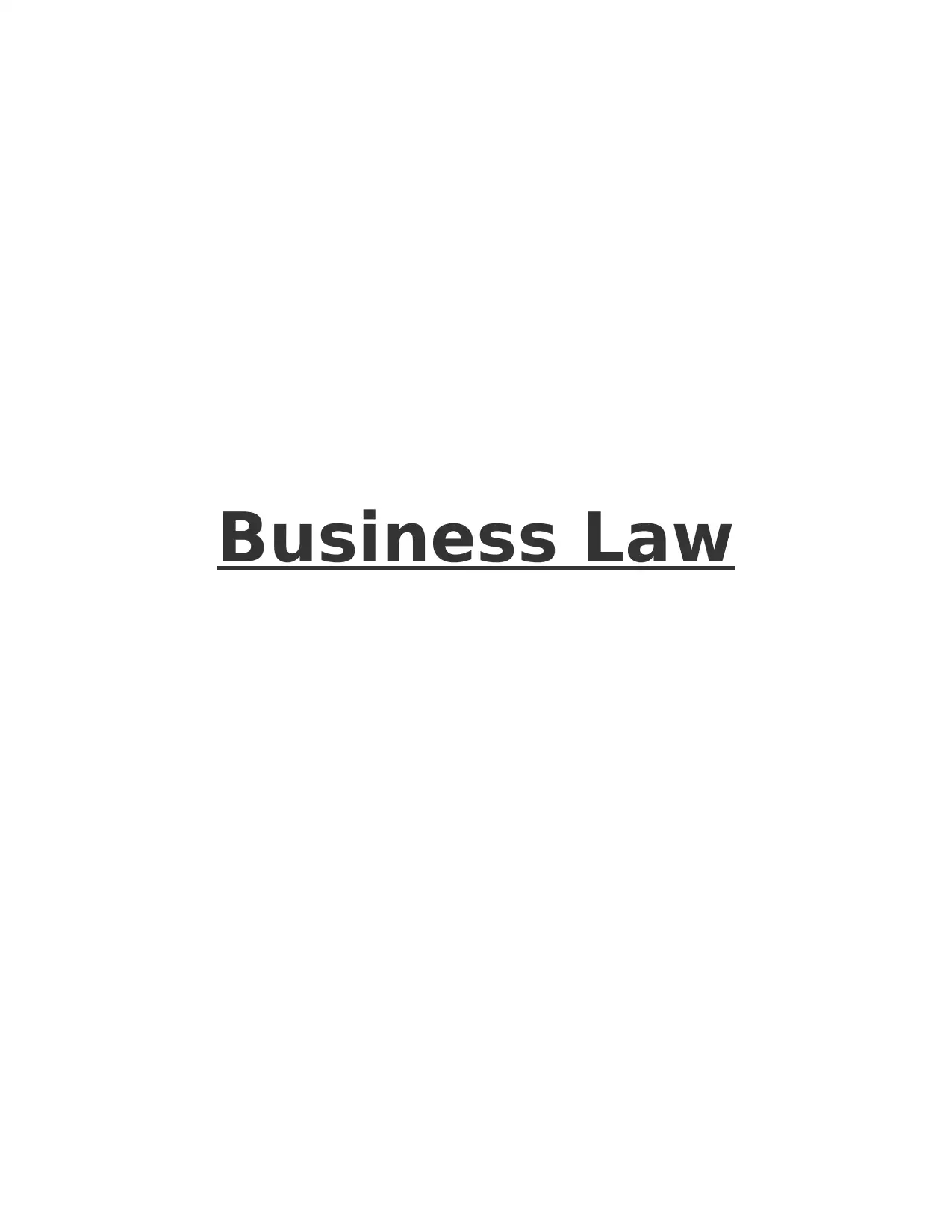
Business Law
Paraphrase This Document
Need a fresh take? Get an instant paraphrase of this document with our AI Paraphraser
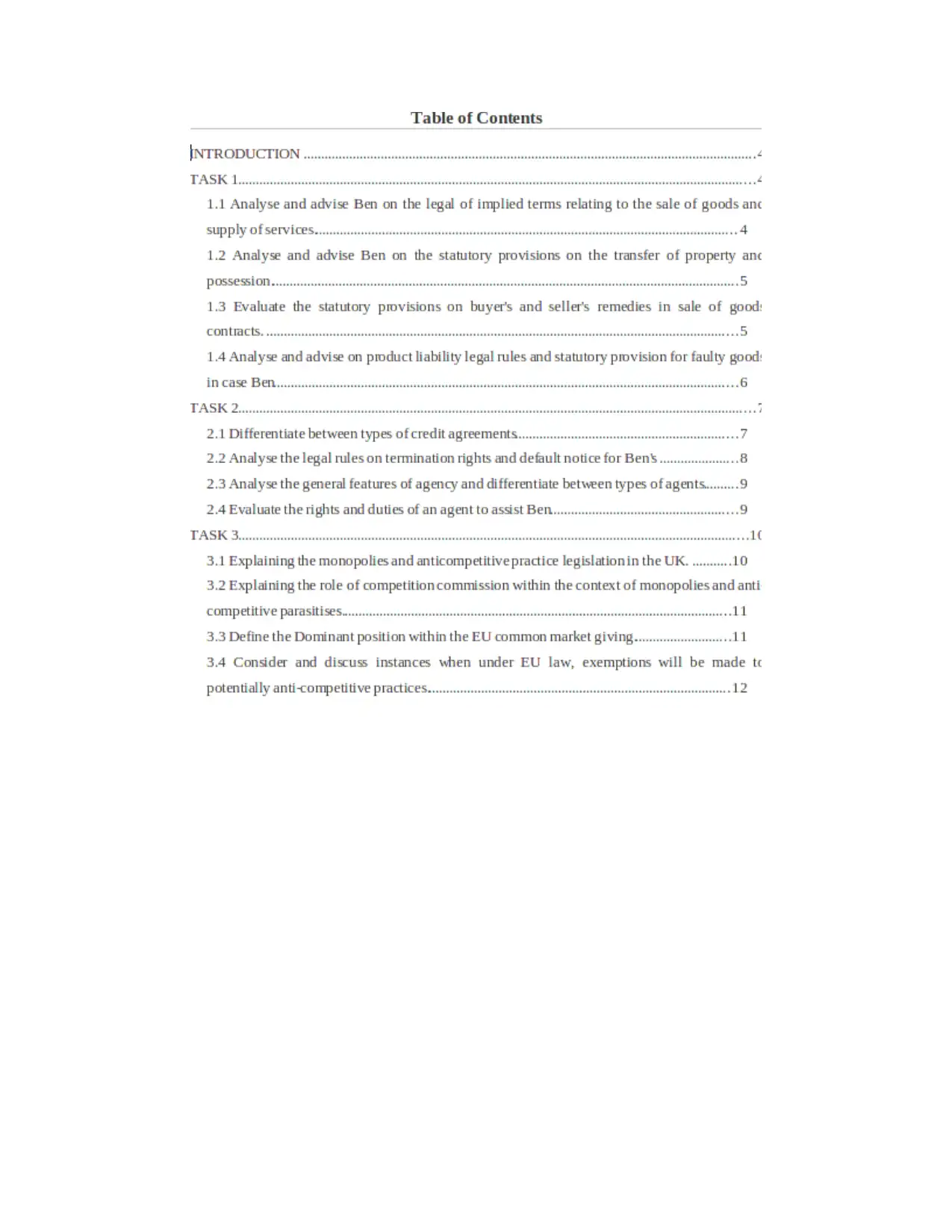
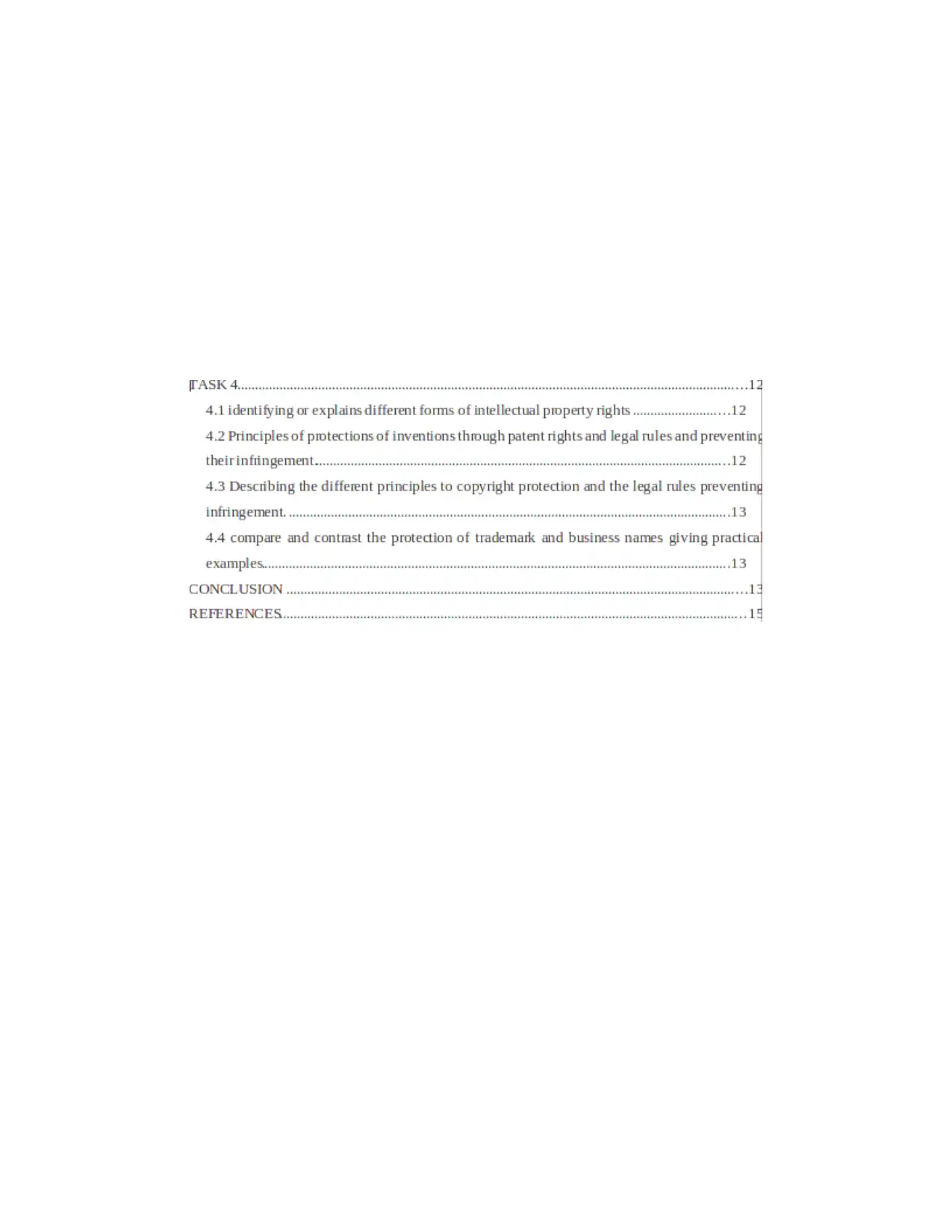
⊘ This is a preview!⊘
Do you want full access?
Subscribe today to unlock all pages.

Trusted by 1+ million students worldwide
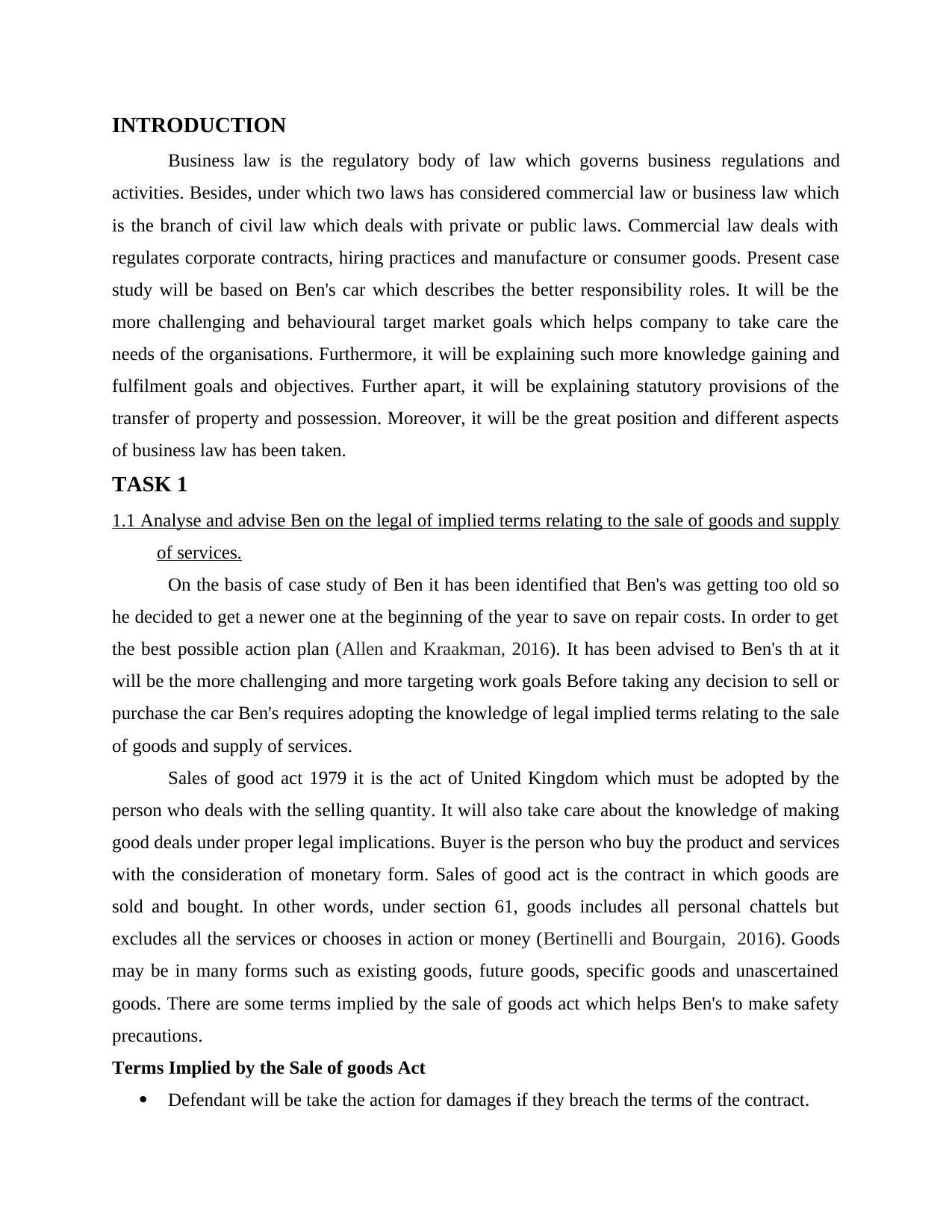
INTRODUCTION
Business law is the regulatory body of law which governs business regulations and
activities. Besides, under which two laws has considered commercial law or business law which
is the branch of civil law which deals with private or public laws. Commercial law deals with
regulates corporate contracts, hiring practices and manufacture or consumer goods. Present case
study will be based on Ben's car which describes the better responsibility roles. It will be the
more challenging and behavioural target market goals which helps company to take care the
needs of the organisations. Furthermore, it will be explaining such more knowledge gaining and
fulfilment goals and objectives. Further apart, it will be explaining statutory provisions of the
transfer of property and possession. Moreover, it will be the great position and different aspects
of business law has been taken.
TASK 1
1.1 Analyse and advise Ben on the legal of implied terms relating to the sale of goods and supply
of services.
On the basis of case study of Ben it has been identified that Ben's was getting too old so
he decided to get a newer one at the beginning of the year to save on repair costs. In order to get
the best possible action plan (Allen and Kraakman, 2016). It has been advised to Ben's th at it
will be the more challenging and more targeting work goals Before taking any decision to sell or
purchase the car Ben's requires adopting the knowledge of legal implied terms relating to the sale
of goods and supply of services.
Sales of good act 1979 it is the act of United Kingdom which must be adopted by the
person who deals with the selling quantity. It will also take care about the knowledge of making
good deals under proper legal implications. Buyer is the person who buy the product and services
with the consideration of monetary form. Sales of good act is the contract in which goods are
sold and bought. In other words, under section 61, goods includes all personal chattels but
excludes all the services or chooses in action or money (Bertinelli and Bourgain, 2016). Goods
may be in many forms such as existing goods, future goods, specific goods and unascertained
goods. There are some terms implied by the sale of goods act which helps Ben's to make safety
precautions.
Terms Implied by the Sale of goods Act
Defendant will be take the action for damages if they breach the terms of the contract.
Business law is the regulatory body of law which governs business regulations and
activities. Besides, under which two laws has considered commercial law or business law which
is the branch of civil law which deals with private or public laws. Commercial law deals with
regulates corporate contracts, hiring practices and manufacture or consumer goods. Present case
study will be based on Ben's car which describes the better responsibility roles. It will be the
more challenging and behavioural target market goals which helps company to take care the
needs of the organisations. Furthermore, it will be explaining such more knowledge gaining and
fulfilment goals and objectives. Further apart, it will be explaining statutory provisions of the
transfer of property and possession. Moreover, it will be the great position and different aspects
of business law has been taken.
TASK 1
1.1 Analyse and advise Ben on the legal of implied terms relating to the sale of goods and supply
of services.
On the basis of case study of Ben it has been identified that Ben's was getting too old so
he decided to get a newer one at the beginning of the year to save on repair costs. In order to get
the best possible action plan (Allen and Kraakman, 2016). It has been advised to Ben's th at it
will be the more challenging and more targeting work goals Before taking any decision to sell or
purchase the car Ben's requires adopting the knowledge of legal implied terms relating to the sale
of goods and supply of services.
Sales of good act 1979 it is the act of United Kingdom which must be adopted by the
person who deals with the selling quantity. It will also take care about the knowledge of making
good deals under proper legal implications. Buyer is the person who buy the product and services
with the consideration of monetary form. Sales of good act is the contract in which goods are
sold and bought. In other words, under section 61, goods includes all personal chattels but
excludes all the services or chooses in action or money (Bertinelli and Bourgain, 2016). Goods
may be in many forms such as existing goods, future goods, specific goods and unascertained
goods. There are some terms implied by the sale of goods act which helps Ben's to make safety
precautions.
Terms Implied by the Sale of goods Act
Defendant will be take the action for damages if they breach the terms of the contract.
Paraphrase This Document
Need a fresh take? Get an instant paraphrase of this document with our AI Paraphraser
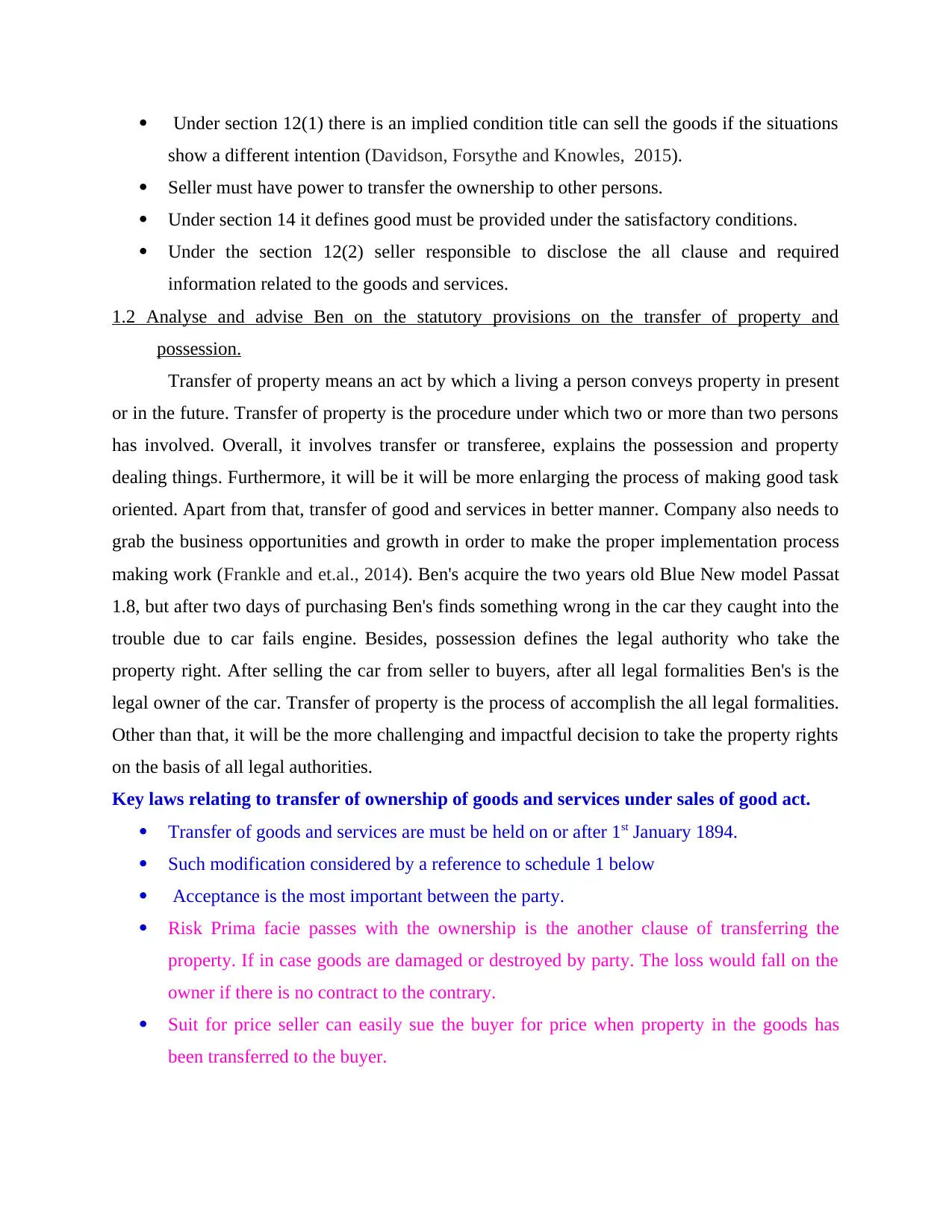
Under section 12(1) there is an implied condition title can sell the goods if the situations
show a different intention (Davidson, Forsythe and Knowles, 2015).
Seller must have power to transfer the ownership to other persons.
Under section 14 it defines good must be provided under the satisfactory conditions.
Under the section 12(2) seller responsible to disclose the all clause and required
information related to the goods and services.
1.2 Analyse and advise Ben on the statutory provisions on the transfer of property and
possession.
Transfer of property means an act by which a living a person conveys property in present
or in the future. Transfer of property is the procedure under which two or more than two persons
has involved. Overall, it involves transfer or transferee, explains the possession and property
dealing things. Furthermore, it will be it will be more enlarging the process of making good task
oriented. Apart from that, transfer of good and services in better manner. Company also needs to
grab the business opportunities and growth in order to make the proper implementation process
making work (Frankle and et.al., 2014). Ben's acquire the two years old Blue New model Passat
1.8, but after two days of purchasing Ben's finds something wrong in the car they caught into the
trouble due to car fails engine. Besides, possession defines the legal authority who take the
property right. After selling the car from seller to buyers, after all legal formalities Ben's is the
legal owner of the car. Transfer of property is the process of accomplish the all legal formalities.
Other than that, it will be the more challenging and impactful decision to take the property rights
on the basis of all legal authorities.
Key laws relating to transfer of ownership of goods and services under sales of good act.
Transfer of goods and services are must be held on or after 1st January 1894.
Such modification considered by a reference to schedule 1 below
Acceptance is the most important between the party.
Risk Prima facie passes with the ownership is the another clause of transferring the
property. If in case goods are damaged or destroyed by party. The loss would fall on the
owner if there is no contract to the contrary.
Suit for price seller can easily sue the buyer for price when property in the goods has
been transferred to the buyer.
show a different intention (Davidson, Forsythe and Knowles, 2015).
Seller must have power to transfer the ownership to other persons.
Under section 14 it defines good must be provided under the satisfactory conditions.
Under the section 12(2) seller responsible to disclose the all clause and required
information related to the goods and services.
1.2 Analyse and advise Ben on the statutory provisions on the transfer of property and
possession.
Transfer of property means an act by which a living a person conveys property in present
or in the future. Transfer of property is the procedure under which two or more than two persons
has involved. Overall, it involves transfer or transferee, explains the possession and property
dealing things. Furthermore, it will be it will be more enlarging the process of making good task
oriented. Apart from that, transfer of good and services in better manner. Company also needs to
grab the business opportunities and growth in order to make the proper implementation process
making work (Frankle and et.al., 2014). Ben's acquire the two years old Blue New model Passat
1.8, but after two days of purchasing Ben's finds something wrong in the car they caught into the
trouble due to car fails engine. Besides, possession defines the legal authority who take the
property right. After selling the car from seller to buyers, after all legal formalities Ben's is the
legal owner of the car. Transfer of property is the process of accomplish the all legal formalities.
Other than that, it will be the more challenging and impactful decision to take the property rights
on the basis of all legal authorities.
Key laws relating to transfer of ownership of goods and services under sales of good act.
Transfer of goods and services are must be held on or after 1st January 1894.
Such modification considered by a reference to schedule 1 below
Acceptance is the most important between the party.
Risk Prima facie passes with the ownership is the another clause of transferring the
property. If in case goods are damaged or destroyed by party. The loss would fall on the
owner if there is no contract to the contrary.
Suit for price seller can easily sue the buyer for price when property in the goods has
been transferred to the buyer.
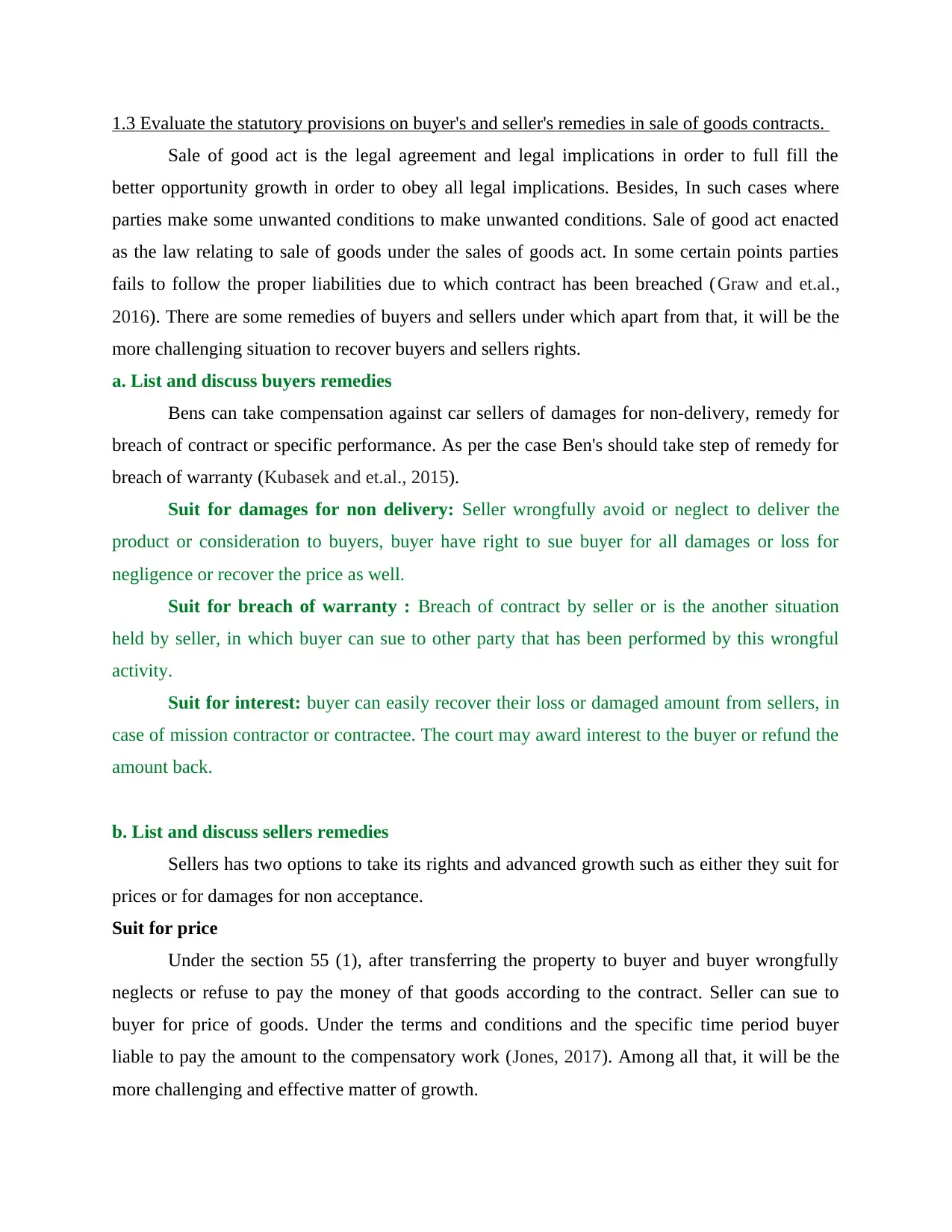
1.3 Evaluate the statutory provisions on buyer's and seller's remedies in sale of goods contracts.
Sale of good act is the legal agreement and legal implications in order to full fill the
better opportunity growth in order to obey all legal implications. Besides, In such cases where
parties make some unwanted conditions to make unwanted conditions. Sale of good act enacted
as the law relating to sale of goods under the sales of goods act. In some certain points parties
fails to follow the proper liabilities due to which contract has been breached (Graw and et.al.,
2016). There are some remedies of buyers and sellers under which apart from that, it will be the
more challenging situation to recover buyers and sellers rights.
a. List and discuss buyers remedies
Bens can take compensation against car sellers of damages for non-delivery, remedy for
breach of contract or specific performance. As per the case Ben's should take step of remedy for
breach of warranty (Kubasek and et.al., 2015).
Suit for damages for non delivery: Seller wrongfully avoid or neglect to deliver the
product or consideration to buyers, buyer have right to sue buyer for all damages or loss for
negligence or recover the price as well.
Suit for breach of warranty : Breach of contract by seller or is the another situation
held by seller, in which buyer can sue to other party that has been performed by this wrongful
activity.
Suit for interest: buyer can easily recover their loss or damaged amount from sellers, in
case of mission contractor or contractee. The court may award interest to the buyer or refund the
amount back.
b. List and discuss sellers remedies
Sellers has two options to take its rights and advanced growth such as either they suit for
prices or for damages for non acceptance.
Suit for price
Under the section 55 (1), after transferring the property to buyer and buyer wrongfully
neglects or refuse to pay the money of that goods according to the contract. Seller can sue to
buyer for price of goods. Under the terms and conditions and the specific time period buyer
liable to pay the amount to the compensatory work (Jones, 2017). Among all that, it will be the
more challenging and effective matter of growth.
Sale of good act is the legal agreement and legal implications in order to full fill the
better opportunity growth in order to obey all legal implications. Besides, In such cases where
parties make some unwanted conditions to make unwanted conditions. Sale of good act enacted
as the law relating to sale of goods under the sales of goods act. In some certain points parties
fails to follow the proper liabilities due to which contract has been breached (Graw and et.al.,
2016). There are some remedies of buyers and sellers under which apart from that, it will be the
more challenging situation to recover buyers and sellers rights.
a. List and discuss buyers remedies
Bens can take compensation against car sellers of damages for non-delivery, remedy for
breach of contract or specific performance. As per the case Ben's should take step of remedy for
breach of warranty (Kubasek and et.al., 2015).
Suit for damages for non delivery: Seller wrongfully avoid or neglect to deliver the
product or consideration to buyers, buyer have right to sue buyer for all damages or loss for
negligence or recover the price as well.
Suit for breach of warranty : Breach of contract by seller or is the another situation
held by seller, in which buyer can sue to other party that has been performed by this wrongful
activity.
Suit for interest: buyer can easily recover their loss or damaged amount from sellers, in
case of mission contractor or contractee. The court may award interest to the buyer or refund the
amount back.
b. List and discuss sellers remedies
Sellers has two options to take its rights and advanced growth such as either they suit for
prices or for damages for non acceptance.
Suit for price
Under the section 55 (1), after transferring the property to buyer and buyer wrongfully
neglects or refuse to pay the money of that goods according to the contract. Seller can sue to
buyer for price of goods. Under the terms and conditions and the specific time period buyer
liable to pay the amount to the compensatory work (Jones, 2017). Among all that, it will be the
more challenging and effective matter of growth.
⊘ This is a preview!⊘
Do you want full access?
Subscribe today to unlock all pages.

Trusted by 1+ million students worldwide
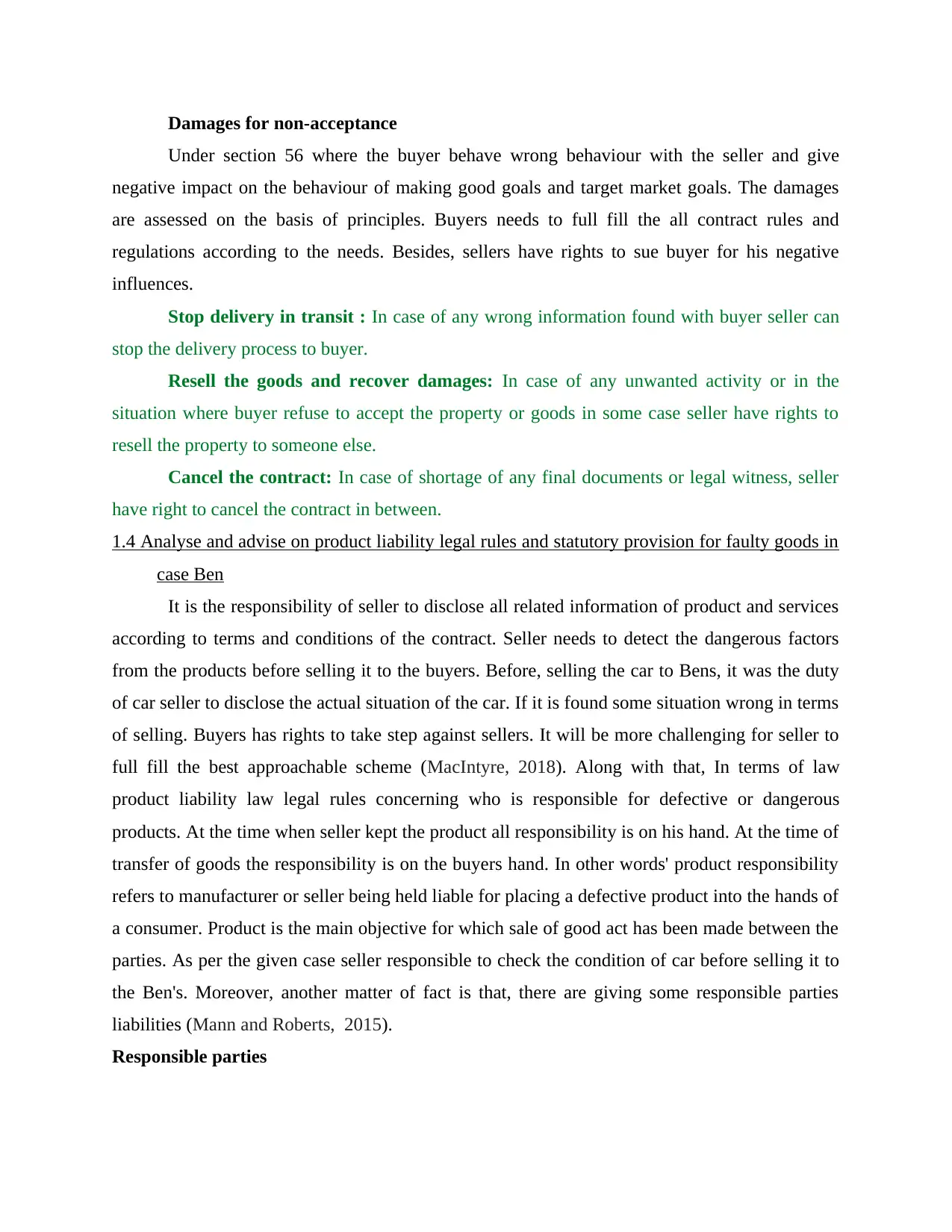
Damages for non-acceptance
Under section 56 where the buyer behave wrong behaviour with the seller and give
negative impact on the behaviour of making good goals and target market goals. The damages
are assessed on the basis of principles. Buyers needs to full fill the all contract rules and
regulations according to the needs. Besides, sellers have rights to sue buyer for his negative
influences.
Stop delivery in transit : In case of any wrong information found with buyer seller can
stop the delivery process to buyer.
Resell the goods and recover damages: In case of any unwanted activity or in the
situation where buyer refuse to accept the property or goods in some case seller have rights to
resell the property to someone else.
Cancel the contract: In case of shortage of any final documents or legal witness, seller
have right to cancel the contract in between.
1.4 Analyse and advise on product liability legal rules and statutory provision for faulty goods in
case Ben
It is the responsibility of seller to disclose all related information of product and services
according to terms and conditions of the contract. Seller needs to detect the dangerous factors
from the products before selling it to the buyers. Before, selling the car to Bens, it was the duty
of car seller to disclose the actual situation of the car. If it is found some situation wrong in terms
of selling. Buyers has rights to take step against sellers. It will be more challenging for seller to
full fill the best approachable scheme (MacIntyre, 2018). Along with that, In terms of law
product liability law legal rules concerning who is responsible for defective or dangerous
products. At the time when seller kept the product all responsibility is on his hand. At the time of
transfer of goods the responsibility is on the buyers hand. In other words' product responsibility
refers to manufacturer or seller being held liable for placing a defective product into the hands of
a consumer. Product is the main objective for which sale of good act has been made between the
parties. As per the given case seller responsible to check the condition of car before selling it to
the Ben's. Moreover, another matter of fact is that, there are giving some responsible parties
liabilities (Mann and Roberts, 2015).
Responsible parties
Under section 56 where the buyer behave wrong behaviour with the seller and give
negative impact on the behaviour of making good goals and target market goals. The damages
are assessed on the basis of principles. Buyers needs to full fill the all contract rules and
regulations according to the needs. Besides, sellers have rights to sue buyer for his negative
influences.
Stop delivery in transit : In case of any wrong information found with buyer seller can
stop the delivery process to buyer.
Resell the goods and recover damages: In case of any unwanted activity or in the
situation where buyer refuse to accept the property or goods in some case seller have rights to
resell the property to someone else.
Cancel the contract: In case of shortage of any final documents or legal witness, seller
have right to cancel the contract in between.
1.4 Analyse and advise on product liability legal rules and statutory provision for faulty goods in
case Ben
It is the responsibility of seller to disclose all related information of product and services
according to terms and conditions of the contract. Seller needs to detect the dangerous factors
from the products before selling it to the buyers. Before, selling the car to Bens, it was the duty
of car seller to disclose the actual situation of the car. If it is found some situation wrong in terms
of selling. Buyers has rights to take step against sellers. It will be more challenging for seller to
full fill the best approachable scheme (MacIntyre, 2018). Along with that, In terms of law
product liability law legal rules concerning who is responsible for defective or dangerous
products. At the time when seller kept the product all responsibility is on his hand. At the time of
transfer of goods the responsibility is on the buyers hand. In other words' product responsibility
refers to manufacturer or seller being held liable for placing a defective product into the hands of
a consumer. Product is the main objective for which sale of good act has been made between the
parties. As per the given case seller responsible to check the condition of car before selling it to
the Ben's. Moreover, another matter of fact is that, there are giving some responsible parties
liabilities (Mann and Roberts, 2015).
Responsible parties
Paraphrase This Document
Need a fresh take? Get an instant paraphrase of this document with our AI Paraphraser
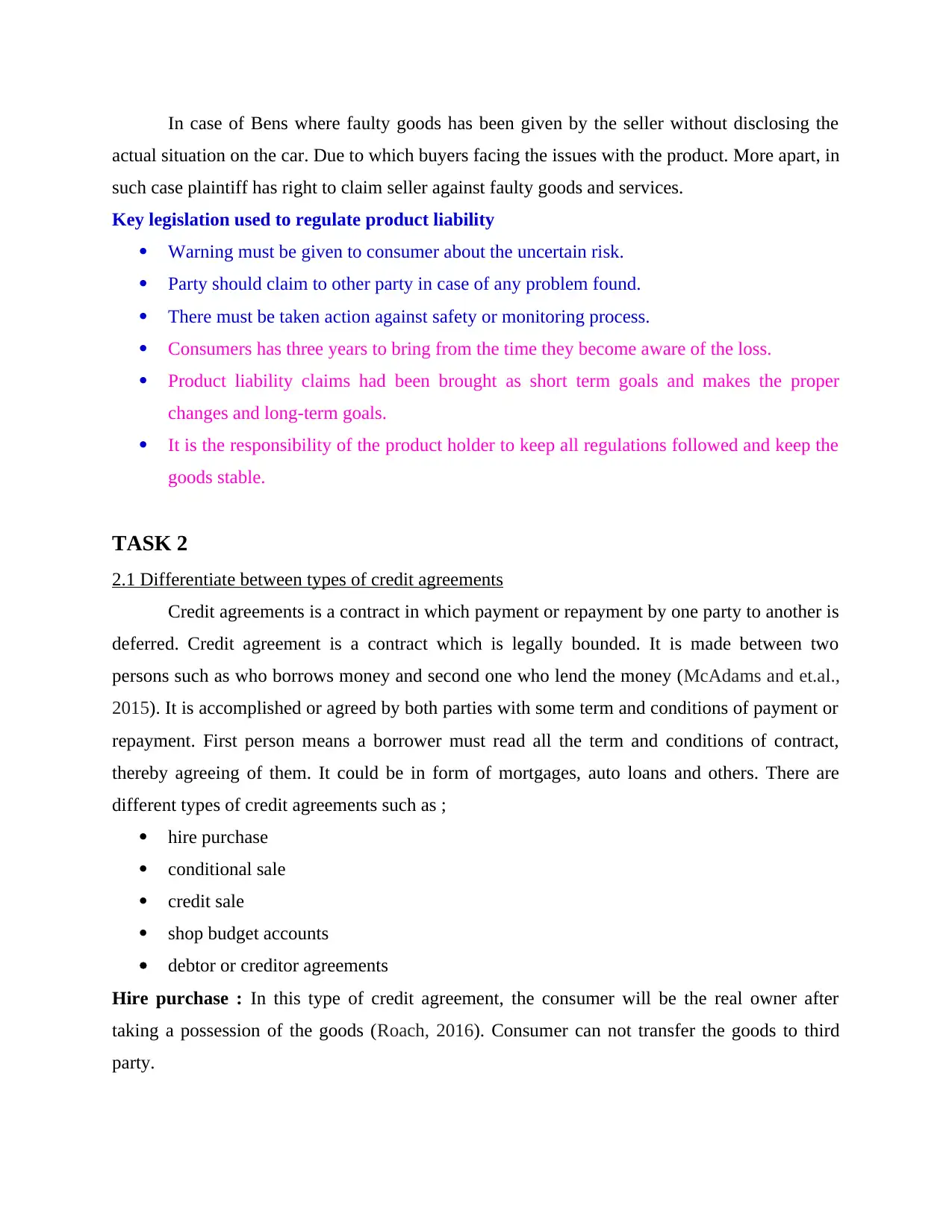
In case of Bens where faulty goods has been given by the seller without disclosing the
actual situation on the car. Due to which buyers facing the issues with the product. More apart, in
such case plaintiff has right to claim seller against faulty goods and services.
Key legislation used to regulate product liability
Warning must be given to consumer about the uncertain risk.
Party should claim to other party in case of any problem found.
There must be taken action against safety or monitoring process.
Consumers has three years to bring from the time they become aware of the loss.
Product liability claims had been brought as short term goals and makes the proper
changes and long-term goals.
It is the responsibility of the product holder to keep all regulations followed and keep the
goods stable.
TASK 2
2.1 Differentiate between types of credit agreements
Credit agreements is a contract in which payment or repayment by one party to another is
deferred. Credit agreement is a contract which is legally bounded. It is made between two
persons such as who borrows money and second one who lend the money (McAdams and et.al.,
2015). It is accomplished or agreed by both parties with some term and conditions of payment or
repayment. First person means a borrower must read all the term and conditions of contract,
thereby agreeing of them. It could be in form of mortgages, auto loans and others. There are
different types of credit agreements such as ;
hire purchase
conditional sale
credit sale
shop budget accounts
debtor or creditor agreements
Hire purchase : In this type of credit agreement, the consumer will be the real owner after
taking a possession of the goods (Roach, 2016). Consumer can not transfer the goods to third
party.
actual situation on the car. Due to which buyers facing the issues with the product. More apart, in
such case plaintiff has right to claim seller against faulty goods and services.
Key legislation used to regulate product liability
Warning must be given to consumer about the uncertain risk.
Party should claim to other party in case of any problem found.
There must be taken action against safety or monitoring process.
Consumers has three years to bring from the time they become aware of the loss.
Product liability claims had been brought as short term goals and makes the proper
changes and long-term goals.
It is the responsibility of the product holder to keep all regulations followed and keep the
goods stable.
TASK 2
2.1 Differentiate between types of credit agreements
Credit agreements is a contract in which payment or repayment by one party to another is
deferred. Credit agreement is a contract which is legally bounded. It is made between two
persons such as who borrows money and second one who lend the money (McAdams and et.al.,
2015). It is accomplished or agreed by both parties with some term and conditions of payment or
repayment. First person means a borrower must read all the term and conditions of contract,
thereby agreeing of them. It could be in form of mortgages, auto loans and others. There are
different types of credit agreements such as ;
hire purchase
conditional sale
credit sale
shop budget accounts
debtor or creditor agreements
Hire purchase : In this type of credit agreement, the consumer will be the real owner after
taking a possession of the goods (Roach, 2016). Consumer can not transfer the goods to third
party.
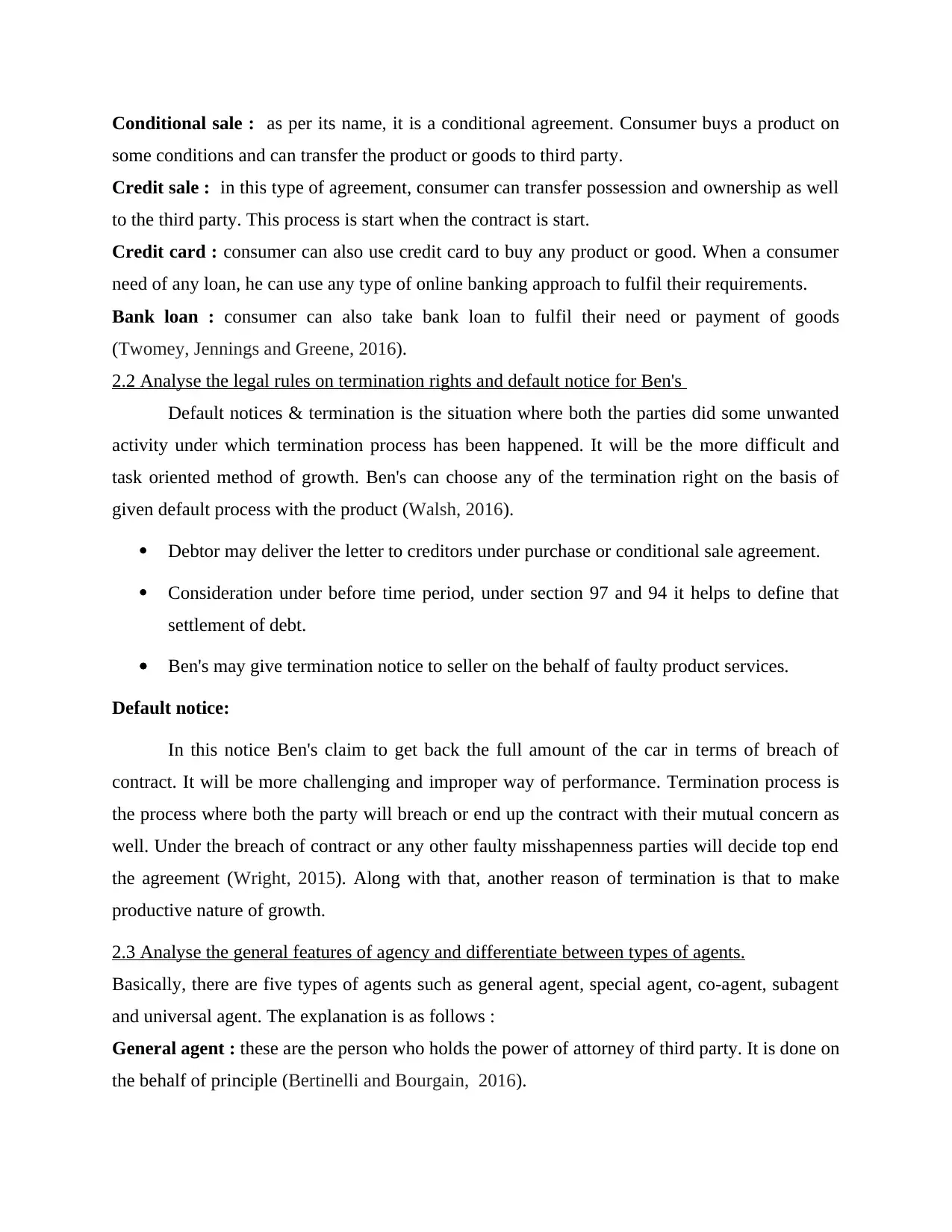
Conditional sale : as per its name, it is a conditional agreement. Consumer buys a product on
some conditions and can transfer the product or goods to third party.
Credit sale : in this type of agreement, consumer can transfer possession and ownership as well
to the third party. This process is start when the contract is start.
Credit card : consumer can also use credit card to buy any product or good. When a consumer
need of any loan, he can use any type of online banking approach to fulfil their requirements.
Bank loan : consumer can also take bank loan to fulfil their need or payment of goods
(Twomey, Jennings and Greene, 2016).
2.2 Analyse the legal rules on termination rights and default notice for Ben's
Default notices & termination is the situation where both the parties did some unwanted
activity under which termination process has been happened. It will be the more difficult and
task oriented method of growth. Ben's can choose any of the termination right on the basis of
given default process with the product (Walsh, 2016).
Debtor may deliver the letter to creditors under purchase or conditional sale agreement.
Consideration under before time period, under section 97 and 94 it helps to define that
settlement of debt.
Ben's may give termination notice to seller on the behalf of faulty product services.
Default notice:
In this notice Ben's claim to get back the full amount of the car in terms of breach of
contract. It will be more challenging and improper way of performance. Termination process is
the process where both the party will breach or end up the contract with their mutual concern as
well. Under the breach of contract or any other faulty misshapenness parties will decide top end
the agreement (Wright, 2015). Along with that, another reason of termination is that to make
productive nature of growth.
2.3 Analyse the general features of agency and differentiate between types of agents.
Basically, there are five types of agents such as general agent, special agent, co-agent, subagent
and universal agent. The explanation is as follows :
General agent : these are the person who holds the power of attorney of third party. It is done on
the behalf of principle (Bertinelli and Bourgain, 2016).
some conditions and can transfer the product or goods to third party.
Credit sale : in this type of agreement, consumer can transfer possession and ownership as well
to the third party. This process is start when the contract is start.
Credit card : consumer can also use credit card to buy any product or good. When a consumer
need of any loan, he can use any type of online banking approach to fulfil their requirements.
Bank loan : consumer can also take bank loan to fulfil their need or payment of goods
(Twomey, Jennings and Greene, 2016).
2.2 Analyse the legal rules on termination rights and default notice for Ben's
Default notices & termination is the situation where both the parties did some unwanted
activity under which termination process has been happened. It will be the more difficult and
task oriented method of growth. Ben's can choose any of the termination right on the basis of
given default process with the product (Walsh, 2016).
Debtor may deliver the letter to creditors under purchase or conditional sale agreement.
Consideration under before time period, under section 97 and 94 it helps to define that
settlement of debt.
Ben's may give termination notice to seller on the behalf of faulty product services.
Default notice:
In this notice Ben's claim to get back the full amount of the car in terms of breach of
contract. It will be more challenging and improper way of performance. Termination process is
the process where both the party will breach or end up the contract with their mutual concern as
well. Under the breach of contract or any other faulty misshapenness parties will decide top end
the agreement (Wright, 2015). Along with that, another reason of termination is that to make
productive nature of growth.
2.3 Analyse the general features of agency and differentiate between types of agents.
Basically, there are five types of agents such as general agent, special agent, co-agent, subagent
and universal agent. The explanation is as follows :
General agent : these are the person who holds the power of attorney of third party. It is done on
the behalf of principle (Bertinelli and Bourgain, 2016).
⊘ This is a preview!⊘
Do you want full access?
Subscribe today to unlock all pages.

Trusted by 1+ million students worldwide
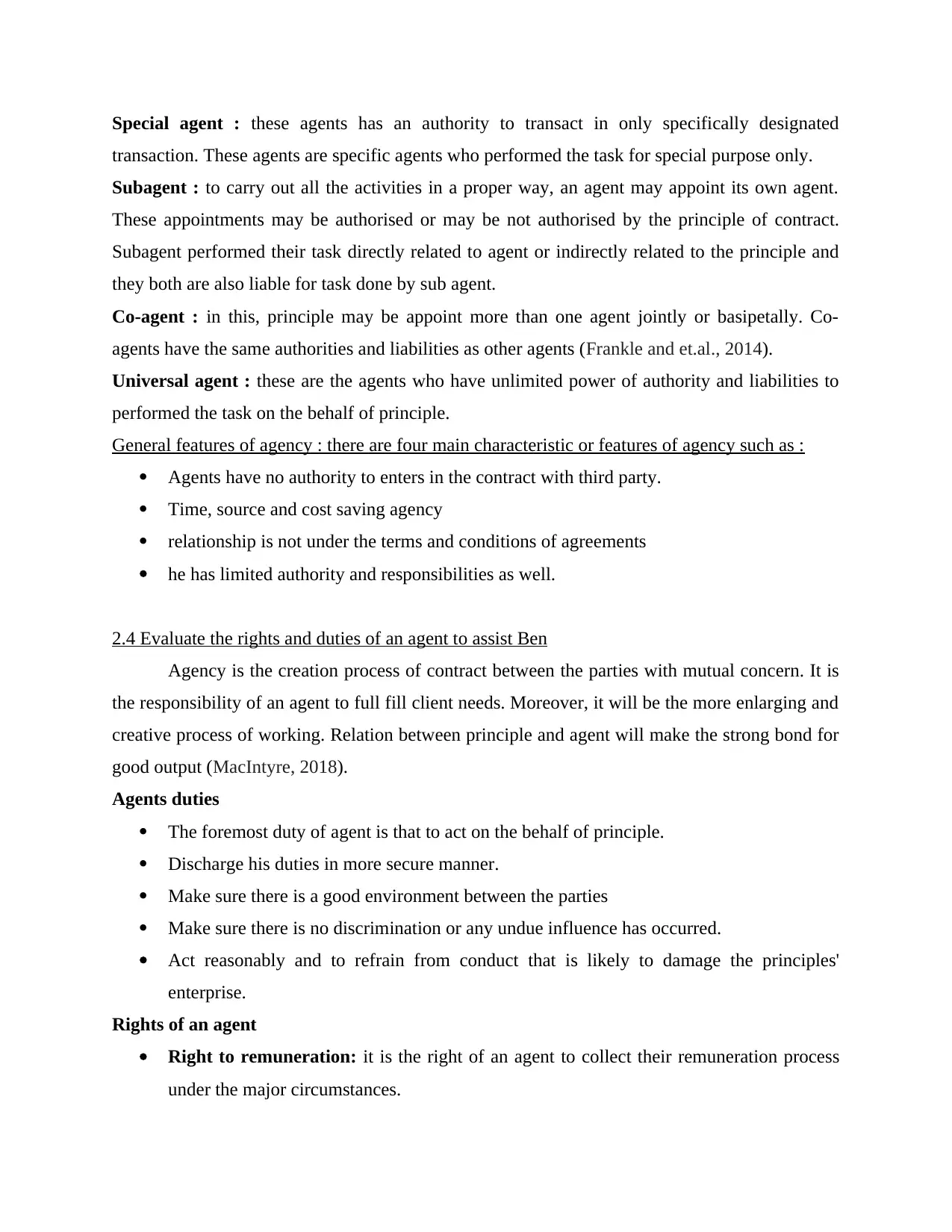
Special agent : these agents has an authority to transact in only specifically designated
transaction. These agents are specific agents who performed the task for special purpose only.
Subagent : to carry out all the activities in a proper way, an agent may appoint its own agent.
These appointments may be authorised or may be not authorised by the principle of contract.
Subagent performed their task directly related to agent or indirectly related to the principle and
they both are also liable for task done by sub agent.
Co-agent : in this, principle may be appoint more than one agent jointly or basipetally. Co-
agents have the same authorities and liabilities as other agents (Frankle and et.al., 2014).
Universal agent : these are the agents who have unlimited power of authority and liabilities to
performed the task on the behalf of principle.
General features of agency : there are four main characteristic or features of agency such as :
Agents have no authority to enters in the contract with third party.
Time, source and cost saving agency
relationship is not under the terms and conditions of agreements
he has limited authority and responsibilities as well.
2.4 Evaluate the rights and duties of an agent to assist Ben
Agency is the creation process of contract between the parties with mutual concern. It is
the responsibility of an agent to full fill client needs. Moreover, it will be the more enlarging and
creative process of working. Relation between principle and agent will make the strong bond for
good output (MacIntyre, 2018).
Agents duties
The foremost duty of agent is that to act on the behalf of principle.
Discharge his duties in more secure manner.
Make sure there is a good environment between the parties
Make sure there is no discrimination or any undue influence has occurred.
Act reasonably and to refrain from conduct that is likely to damage the principles'
enterprise.
Rights of an agent
Right to remuneration: it is the right of an agent to collect their remuneration process
under the major circumstances.
transaction. These agents are specific agents who performed the task for special purpose only.
Subagent : to carry out all the activities in a proper way, an agent may appoint its own agent.
These appointments may be authorised or may be not authorised by the principle of contract.
Subagent performed their task directly related to agent or indirectly related to the principle and
they both are also liable for task done by sub agent.
Co-agent : in this, principle may be appoint more than one agent jointly or basipetally. Co-
agents have the same authorities and liabilities as other agents (Frankle and et.al., 2014).
Universal agent : these are the agents who have unlimited power of authority and liabilities to
performed the task on the behalf of principle.
General features of agency : there are four main characteristic or features of agency such as :
Agents have no authority to enters in the contract with third party.
Time, source and cost saving agency
relationship is not under the terms and conditions of agreements
he has limited authority and responsibilities as well.
2.4 Evaluate the rights and duties of an agent to assist Ben
Agency is the creation process of contract between the parties with mutual concern. It is
the responsibility of an agent to full fill client needs. Moreover, it will be the more enlarging and
creative process of working. Relation between principle and agent will make the strong bond for
good output (MacIntyre, 2018).
Agents duties
The foremost duty of agent is that to act on the behalf of principle.
Discharge his duties in more secure manner.
Make sure there is a good environment between the parties
Make sure there is no discrimination or any undue influence has occurred.
Act reasonably and to refrain from conduct that is likely to damage the principles'
enterprise.
Rights of an agent
Right to remuneration: it is the right of an agent to collect their remuneration process
under the major circumstances.
Paraphrase This Document
Need a fresh take? Get an instant paraphrase of this document with our AI Paraphraser
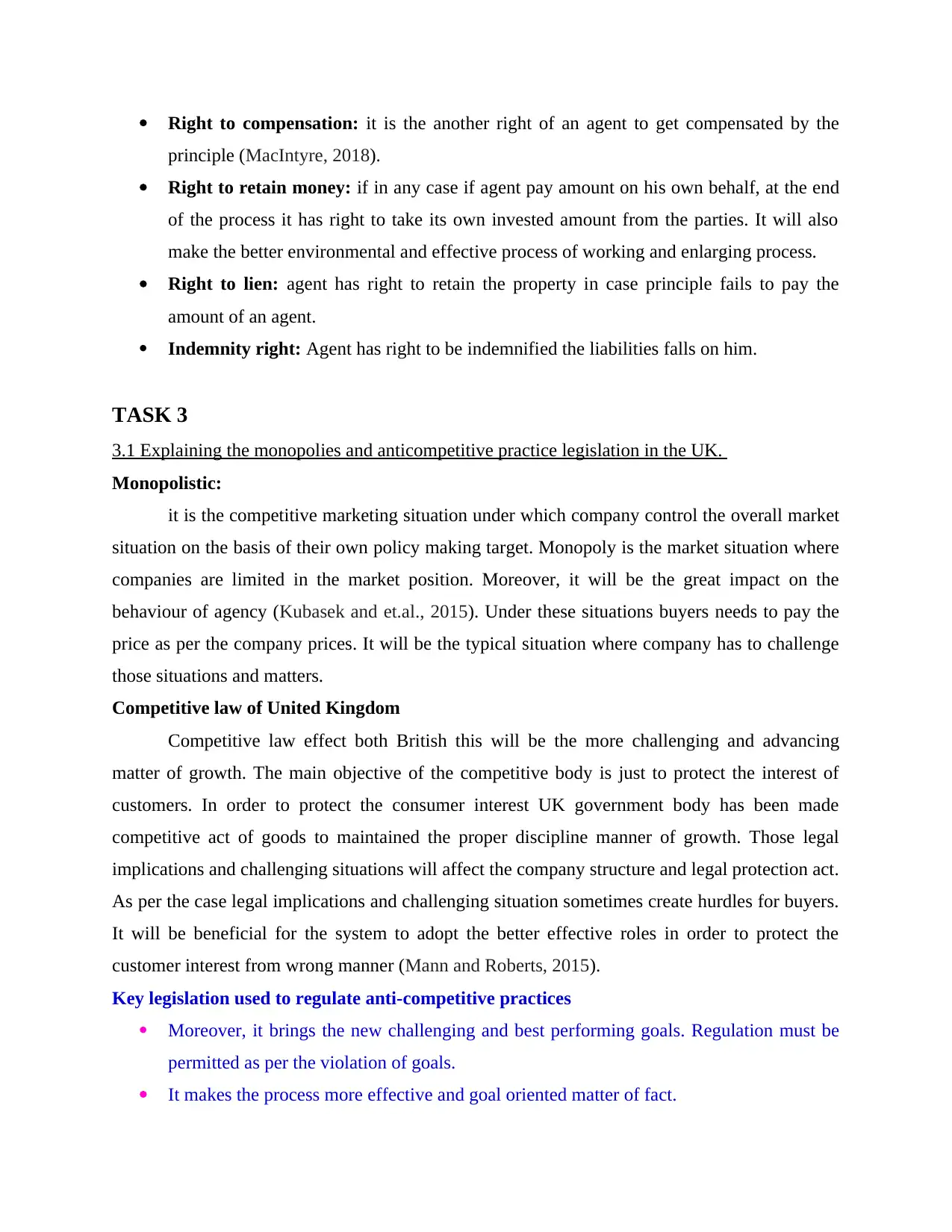
Right to compensation: it is the another right of an agent to get compensated by the
principle (MacIntyre, 2018).
Right to retain money: if in any case if agent pay amount on his own behalf, at the end
of the process it has right to take its own invested amount from the parties. It will also
make the better environmental and effective process of working and enlarging process.
Right to lien: agent has right to retain the property in case principle fails to pay the
amount of an agent.
Indemnity right: Agent has right to be indemnified the liabilities falls on him.
TASK 3
3.1 Explaining the monopolies and anticompetitive practice legislation in the UK.
Monopolistic:
it is the competitive marketing situation under which company control the overall market
situation on the basis of their own policy making target. Monopoly is the market situation where
companies are limited in the market position. Moreover, it will be the great impact on the
behaviour of agency (Kubasek and et.al., 2015). Under these situations buyers needs to pay the
price as per the company prices. It will be the typical situation where company has to challenge
those situations and matters.
Competitive law of United Kingdom
Competitive law effect both British this will be the more challenging and advancing
matter of growth. The main objective of the competitive body is just to protect the interest of
customers. In order to protect the consumer interest UK government body has been made
competitive act of goods to maintained the proper discipline manner of growth. Those legal
implications and challenging situations will affect the company structure and legal protection act.
As per the case legal implications and challenging situation sometimes create hurdles for buyers.
It will be beneficial for the system to adopt the better effective roles in order to protect the
customer interest from wrong manner (Mann and Roberts, 2015).
Key legislation used to regulate anti-competitive practices
Moreover, it brings the new challenging and best performing goals. Regulation must be
permitted as per the violation of goals.
It makes the process more effective and goal oriented matter of fact.
principle (MacIntyre, 2018).
Right to retain money: if in any case if agent pay amount on his own behalf, at the end
of the process it has right to take its own invested amount from the parties. It will also
make the better environmental and effective process of working and enlarging process.
Right to lien: agent has right to retain the property in case principle fails to pay the
amount of an agent.
Indemnity right: Agent has right to be indemnified the liabilities falls on him.
TASK 3
3.1 Explaining the monopolies and anticompetitive practice legislation in the UK.
Monopolistic:
it is the competitive marketing situation under which company control the overall market
situation on the basis of their own policy making target. Monopoly is the market situation where
companies are limited in the market position. Moreover, it will be the great impact on the
behaviour of agency (Kubasek and et.al., 2015). Under these situations buyers needs to pay the
price as per the company prices. It will be the typical situation where company has to challenge
those situations and matters.
Competitive law of United Kingdom
Competitive law effect both British this will be the more challenging and advancing
matter of growth. The main objective of the competitive body is just to protect the interest of
customers. In order to protect the consumer interest UK government body has been made
competitive act of goods to maintained the proper discipline manner of growth. Those legal
implications and challenging situations will affect the company structure and legal protection act.
As per the case legal implications and challenging situation sometimes create hurdles for buyers.
It will be beneficial for the system to adopt the better effective roles in order to protect the
customer interest from wrong manner (Mann and Roberts, 2015).
Key legislation used to regulate anti-competitive practices
Moreover, it brings the new challenging and best performing goals. Regulation must be
permitted as per the violation of goals.
It makes the process more effective and goal oriented matter of fact.
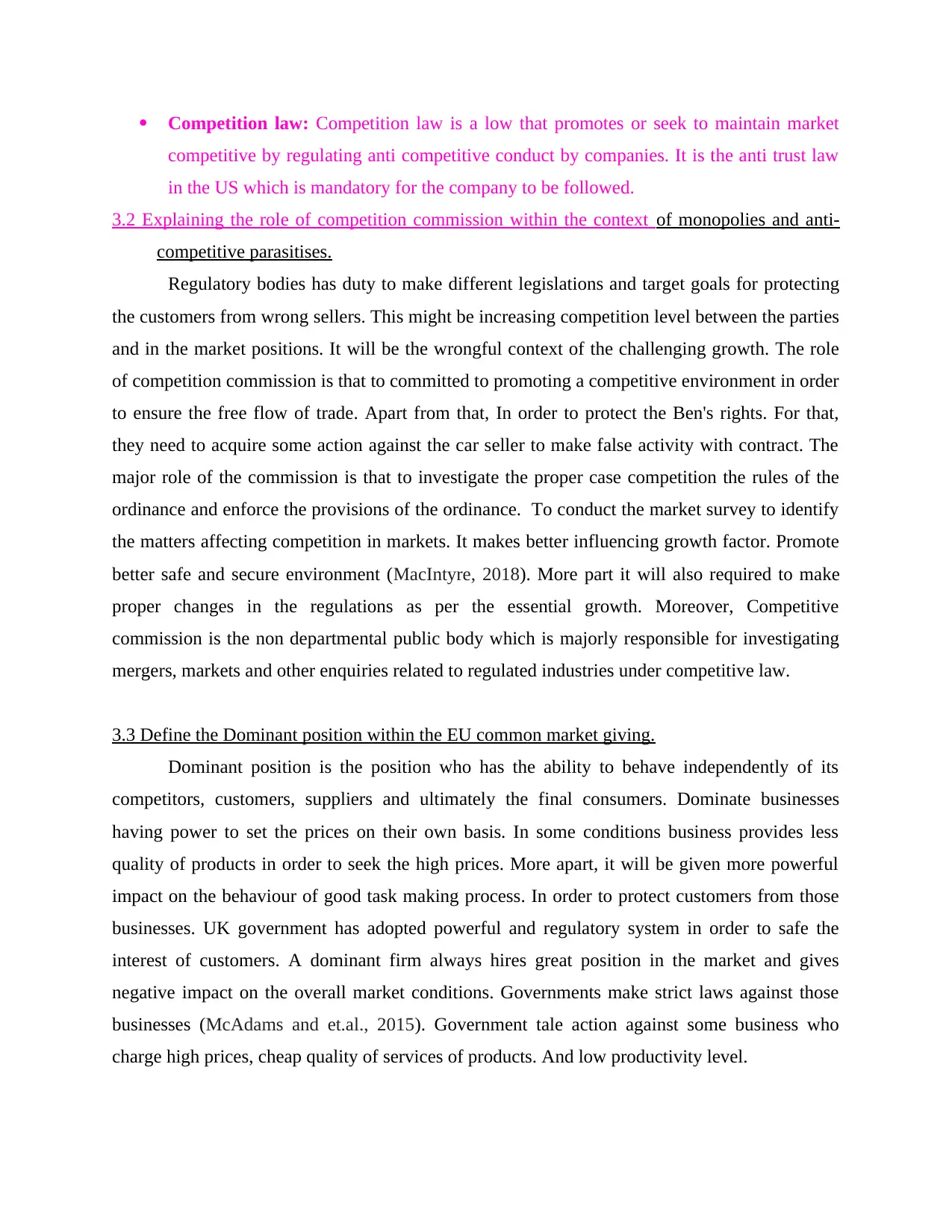
Competition law: Competition law is a low that promotes or seek to maintain market
competitive by regulating anti competitive conduct by companies. It is the anti trust law
in the US which is mandatory for the company to be followed.
3.2 Explaining the role of competition commission within the context of monopolies and anti-
competitive parasitises.
Regulatory bodies has duty to make different legislations and target goals for protecting
the customers from wrong sellers. This might be increasing competition level between the parties
and in the market positions. It will be the wrongful context of the challenging growth. The role
of competition commission is that to committed to promoting a competitive environment in order
to ensure the free flow of trade. Apart from that, In order to protect the Ben's rights. For that,
they need to acquire some action against the car seller to make false activity with contract. The
major role of the commission is that to investigate the proper case competition the rules of the
ordinance and enforce the provisions of the ordinance. To conduct the market survey to identify
the matters affecting competition in markets. It makes better influencing growth factor. Promote
better safe and secure environment (MacIntyre, 2018). More part it will also required to make
proper changes in the regulations as per the essential growth. Moreover, Competitive
commission is the non departmental public body which is majorly responsible for investigating
mergers, markets and other enquiries related to regulated industries under competitive law.
3.3 Define the Dominant position within the EU common market giving.
Dominant position is the position who has the ability to behave independently of its
competitors, customers, suppliers and ultimately the final consumers. Dominate businesses
having power to set the prices on their own basis. In some conditions business provides less
quality of products in order to seek the high prices. More apart, it will be given more powerful
impact on the behaviour of good task making process. In order to protect customers from those
businesses. UK government has adopted powerful and regulatory system in order to safe the
interest of customers. A dominant firm always hires great position in the market and gives
negative impact on the overall market conditions. Governments make strict laws against those
businesses (McAdams and et.al., 2015). Government tale action against some business who
charge high prices, cheap quality of services of products. And low productivity level.
competitive by regulating anti competitive conduct by companies. It is the anti trust law
in the US which is mandatory for the company to be followed.
3.2 Explaining the role of competition commission within the context of monopolies and anti-
competitive parasitises.
Regulatory bodies has duty to make different legislations and target goals for protecting
the customers from wrong sellers. This might be increasing competition level between the parties
and in the market positions. It will be the wrongful context of the challenging growth. The role
of competition commission is that to committed to promoting a competitive environment in order
to ensure the free flow of trade. Apart from that, In order to protect the Ben's rights. For that,
they need to acquire some action against the car seller to make false activity with contract. The
major role of the commission is that to investigate the proper case competition the rules of the
ordinance and enforce the provisions of the ordinance. To conduct the market survey to identify
the matters affecting competition in markets. It makes better influencing growth factor. Promote
better safe and secure environment (MacIntyre, 2018). More part it will also required to make
proper changes in the regulations as per the essential growth. Moreover, Competitive
commission is the non departmental public body which is majorly responsible for investigating
mergers, markets and other enquiries related to regulated industries under competitive law.
3.3 Define the Dominant position within the EU common market giving.
Dominant position is the position who has the ability to behave independently of its
competitors, customers, suppliers and ultimately the final consumers. Dominate businesses
having power to set the prices on their own basis. In some conditions business provides less
quality of products in order to seek the high prices. More apart, it will be given more powerful
impact on the behaviour of good task making process. In order to protect customers from those
businesses. UK government has adopted powerful and regulatory system in order to safe the
interest of customers. A dominant firm always hires great position in the market and gives
negative impact on the overall market conditions. Governments make strict laws against those
businesses (McAdams and et.al., 2015). Government tale action against some business who
charge high prices, cheap quality of services of products. And low productivity level.
⊘ This is a preview!⊘
Do you want full access?
Subscribe today to unlock all pages.

Trusted by 1+ million students worldwide
1 out of 16
Related Documents
Your All-in-One AI-Powered Toolkit for Academic Success.
+13062052269
info@desklib.com
Available 24*7 on WhatsApp / Email
![[object Object]](/_next/static/media/star-bottom.7253800d.svg)
Unlock your academic potential
Copyright © 2020–2026 A2Z Services. All Rights Reserved. Developed and managed by ZUCOL.





